... He [Allah]has selected you and consraint upon you in the religion the religion of your forefather Abraham ... (Surat al Hajj:78)
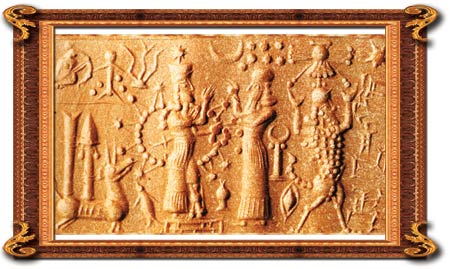
This locket, from the eighth or ninth century BCE, symbolizes the Assyrians' idolatrous worship. The main deity of Assyria, the strongest power in Mesopotamia between 1900 and 612 BCE, was known as Asshur.
Who could have a better religion than someone who submits himself completely to Allah, is a good-doer, and follows the religion of Abraham, a man of pure natural belief?... (Surat an-Nisa: 125)
People continue to argue over which religion the Prophet Abraham (pbuh) followed. Jews regard him as a Jewish prophet and claim to follow his path. Christians also consider him a Jewish prophet, but claim that he followed the Prophet Jesus (pbuh), who came after him.
n the Qur'an however, Allah reveals the truth of this matter by providing certain information:
Or do they say that Abraham, Ishmael, Isaac, Jacob, and the Descendents were Jews or Christians? Say: "Do you know better, or does Allah?" Who could do greater wrong than someone who hides the evidence he has been given by Allah? Allah is not unaware of what you do. (Surat al-Baqara: 140)
Moreover, other verses expose just how irrational this debate really is:
O People of the Book. Why do you argue about Abraham when the Torah and Gospel were only sent down after him? Why don't you use your intellect? You are the ones who argued about that of which you had knowledge. But why do you argue about something of which you have no knowledge? Allah knows; you do not know. (Surah Al 'Imran: 65-66)
 ... He [Allah]has selected you and consraint upon you in the religion the religion of your forefather Abraham ... (Surat al Hajj:78) |
Allah provides in the Qur'an the most accurate information about the Prophet Abraham (pbuh), for it is the only uncorrupted book of Allah. If people take other sources as guides, they fall into great error and interpret matters in the light of their own ideas and beliefs. As in all matters, however, believers take the Qur'an and the Sunnah of our Prophet (may Allah bless him and grant him peace) as the only true sources of information about the prophets and their lines, for teaching falsehoods and engaging in speculation and guesswork, particularly about the prophets, displeases Allah.
Only Allah states in the Qur'an the whole truth about the Prophet Abraham (pbuh):
Abraham was neither a Jew nor a Christian, but a man of pure natural belief—a Muslim. He was not one of the idolaters. (Surah Al 'Imran: 67)
In the Qur'an Allah calls the Prophet Abraham (pbuh) a hanif, instead of a Jew or a Christian. Hanif means a devout, upright, and righteous person who submits to Allah's command and never moves away from His religion. The most hanif characteristics of the Prophet Abraham (pbuh) were his belief in the One and Only Allah and his submission to Him.
In another verse, our Lord commands the Prophet Muhammad (may Allah bless him and grant him peace) to abide by the Prophet Abraham's (pbuh) religion:
Then We revealed to you: "Follow the religion of Abraham, a man of pure natural belief. He was not one of the idolaters." (Surat an-Nahl: 123)
Allah wishes people to turn to religion in a hanif manner, as pure believers. Allah clearly emphasizes that hanif people do not ascribe partners to Him:
So set your face firmly towards the Religion, as a pure natural believer, Allah's natural pattern on which He made humanity. There is no changing in Allah's Creation. That is the true Religion—but most people do not know it. (Surat ar-Rum: 30)
As can be understood from several verses, the Prophet Abraham's (pbuh) religion was essentially the same as Islam. In any case, all divinely revealed religions are, in their original and uncorrupted forms, essentially built on earning Allah's good pleasure, compassion, and Paradise. The Prophet Abraham's (pbuh) children and grandchildren, as well as other devout individuals from his line, adhered to this religion after his death. For example, Allah tells in the Qur'an the Prophet Joseph's (pbuh) address to his fellow prisoners:
I hold fast to the creed of my forebears Abraham, Isaac, and Jacob. We don't associate anything with Allah. And that is how Allah has favored us and all humanity, but most do not give thanks. (Surah Yusuf: 38)
All hanifs, regardless of when they live, are distinguished by their glorification of Allah without ascribing partners to Him. One of the prophets' main duties was to rescue people from their misguided belief systems and worldviews, as well as those practices and values that transgressed the limits set down by Allah for humanity, and to call their people to the true religion. One hadith informs us of the following:
Abu Bakrah (ra) relates that: "The Messenger of Allah, may Allah bless him and grant him peace, once asked: 'Shall I inform you of a great sin, one of the greatest sins? ...[It is] to ascribe a partner to Allah.'"2
In one verse, Allah reveals that Islam is as easy as the Prophet Abraham's (pbuh) religion:
... He [Allah] has selected you and not placed any constraint upon you in the religion—the religion of your forefather Abraham. He named you Muslims before, and also in this, so that the messenger could be witness against you and you could be witnesses against all of humanity. So perform the prescribed prayers, give alms, and hold fast to Allah. He is your Protector—the Best Protector, the Best Helper. (Surat al-Hajj: 78)
According to the Qur'an the people who turn to Allah and live by His religion in its true sense are Muslim. The word Muslim comes from the Arabic word salam and means one who has achieved well-being or who has submitted (to Allah). The essence of being Muslim lies in submitting to Allah and living in the ensuing peace and security. The prophets, all of whom guided their people to the true path, submitted totally to our Lord and were sincerely devoted to Him, are role models for us. By turning to and then submitting to our Lord, seeking refuge in Him, taking Him as their only friend, and asking for help only from Him, they are all called Muslim in the Qur'an.
For instance, Allah commanded the prophet Noah (pbuh) to tell his tribe "My wage is the responsibility of Allah alone. I am commanded to be one of the Muslims" (Surah Yunus: 72); the Prophet Moses (pbuh) told his tribe"My people. If you believe in Allah, then put your trust in Him, if you are Muslims" (Surah Yunus: 84); and the Prophet Solomon (pbuh) addressed his tribe in these terms: "Do not rise up against me, but come to me in submission [as Muslims]" (Surat An-Naml: 31). In the Qur'an Allah reveals the following to His followers:
When I inspired the Disciples [of Jesus] to believe in Me and in My Messenger [Jesus], they said: "We believe. Bear witness that we are Muslims." (Surat al-Ma'ida: 111)
As can be seen from the above verses, sincere believers are those people who submit to Allah, live solely by religious moral values, and have pure faith. Allah honors such people with the name Muslim.
The Prophet Joseph's (pbuh) prayer as stated in the verse is a fine example for us in several areas. Allah reveals it in the following verse:
... You have granted power to me in the land and taught me the true meaning of events. O, Originator of the heavens and Earth. You are my Friend in this world and the Hereafter, so take me as a Muslim at my death and join me to the people who are righteous. (Surah Yusuf: 101)
The Prophet Abraham's (pbuh) joyful faith in Allah, his deep love for Him, his submission to all of His commands, as well as his obedience and superior morality, are explained in the Qur'an. Some of these verses read:
Our Lord, make us both Muslims submitted to You and our descendents a Muslim community submitted to You. Show us our rites of worship and turn toward us. You are the Ever-Returning, the Most Merciful. (Surat al-Baqara: 128)
When his Lord said to him: "Become a Muslim," he [Abraham] said: "I am a Muslim who has submitted to the Lord of all the worlds." (Surat al-Baqara: 131)
Every Muslim must take the Prophet Abraham's (pbuh) pleasing morality, sincere faith, and total submission and obedience to Allah as role models. In fact, his discernment and determination in presenting Allah's message are among the important traits that all people who call themselves Muslims should adopt.
Originally, all divine religions were based on the Prophet Abraham's (pbuh) religion. However, Christianity and Judaism were corrupted over time and so moved away from their original nature: not ascribing partners to Allah (the greatest sin) and living solely to earn His good pleasure. As a matter of fact, there are many parts conforming to true religion and good morals in the Torah and the Gospel of our day.
The love and respect felt by both present-day Christians and Jews for the Prophet Abraham (pbuh) unites them in a common foundation with Muslims. Members of these three divinely revealed religions therefore share a common belief in Allah, which they have inherited from the Prophet Abraham (pbuh), and seek to serve Him. On the other hand, it is clear that the error of trinity held by some Christians is a deviant belief and a great sin, and this is revealed in the Qur'an. However, the Prophet Abraham's (pbuh) pure natural belief is a common word between the Muslims and the People of the Book. Allah reveals in the Qur'an that Muslims have invited them to this common word:
Say: "O People of the Book [Christians and Jews], come to a proposition that is the same for us and you—that we should worship none but Allah, associate no partners with Him, and take no one of us as lords besides Allah." If they turn away, say: "Bear witness that we are Muslims." (Surah Al 'Imran: 64)
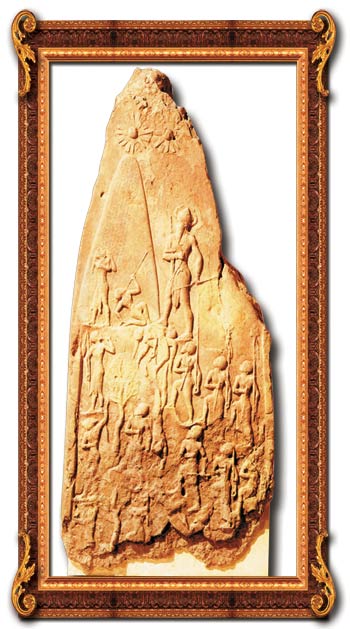
The majority of Mesopotamian societies worshipped the Sun and the Moon. It is believed that Naram Sin, king of Akkadia, was deified by the moon god and possessed extraordinary powers. (Side) A victory inscription of King Naram Sin and his pagan people who prostrated to the Moon.
Every prophet was charged with informing his tribe of Allah's commands and prohibitions. Our Prophet (may Allah bless him and grant him peace), the light of all the worlds, who called people to true religion within idolaters of Mecca, the Prophet Noah (pbuh), the Prophet Salih (pbuh) (of Thamud), the Prophet Lot (pbuh), the Prophet Shuayb (pbuh) (of Madyan), the Prophet Moses (pbuh) (of the Children of Israel), the Prophet Jesus (pbuh), and all other prophets informed their tribes of Allah's existence and called on them to live by the true religion's moral values. However, these prophets often found that the majority of their tribes denied Allah and rejected them and even initiated multifaceted struggles against them consisting of vile slanders, threats, and aggression. In some cases, they resorted to forced expulsion, arrest, or martyr the prophets with their imprudent minds to prevent them from performing their tasks Allah charged them with. Allah reveals how the traps set for the Prophet Muhammad (may Allah bless him and grant him peace) will end in failure:
When those who do not believe were plotting against you to imprison you, kill you, or expel you: they were plotting and Allah was planning, but Allah is the Best Planner. (Surat al-Anfal: 30)
As stated earlier, the Prophet Abraham's (pbuh) tribe worshipped statues that their ancestors had made from stone and wood in grave irrationality. The Prophet Abraham (pbuh), who had the determination and the powerful faith to single-handedly tell them of Allah's existence and oneness, was sent to guide them from their blind devotion to their ancestors' paganism into the light of His religion.
Throughout history, the majority has often decided which ideas and beliefs are to be accepted as true. Given that it is difficult to stand up against the majority in societies that are far from religion, many people eventually agree, either willingly or unwillingly, to submit to ideas and beliefs that they know to be wrong. The prophets and the believers who followed them, however, always opposed the unbelieving majority and displayed enormous courage in the face of the ensuing pressure, threats, or attacks. They remained loyal to Allah's religion by scrupulously performing their religious observations and abiding by our Lord's commands out of their fear and awe of Him, as well as their complete trust in Him.
The Prophet Abraham (pbuh), whom Allah praised as being "a community in himself" (Surat an-Nahl: 120), stood alone against his father and his entire pagan tribe. He patiently explained why their idols could never attain any divine quality and that Allah was the only true God. When necessary, even by standing against the entire community in order to tell the truth, his opposition to his tribe's paganism, as well as his method of challenging their superstitions and working to guide them to the true path despite their hostility, clearly revealed his powerful faith, submission, sincerity, and superior character. All of these characteristics made him a courageous and determined individual. Allah reveals some of his words in the Qur'an, as follows:
His tribe argued with him. He said: "Are you arguing with me about Allah, when He has guided me? I have no fear of any partner you ascribe to Him, unless my Lord should will such a thing to happen. My Lord encompasses all things in His knowledge, so will you not pay heed? Why should I fear what you have associated with Him, when you yourselves apparently have no fear of associating partners with Allah, for which He has sent down no authority to you? Which of the two parties is more entitled to feel safe, if you have any knowledge?" (Surat al-An'am: 80-81)
Such conversations with his tribe reveal many pleasing examples of his deep and strong faith. Thanks to the superior wisdom and understanding imparted to him by our Lord, the Prophet Abraham (pbuh) gave enormously effective addresses and the wisest of examples. Looked at with the eye of wisdom, present-day Muslims can use the Prophet Abraham's (pbuh) means and methods Allah revealed to him to invite their own people to believe in Allah. Given this, we will now look at some of the Prophet Abraham's (pbuh) wise explanations.
 O Messenger!Transmit what has been sent down to you from your Lord.If you do not do it you will not have tansmitted His Message... (Surat al-Maida:67) |
All Muslims are responsible for inviting people to believe in Allah. In the Qur'an Allah refers to this as commanding what is right and forbidding what is wrong. This duty arises out of the fact that people must be warned, in other words informed and reminded of certain important truths, such as that Allah created the universe from nothing, that every human being is responsible to our Lord and will have to account to Him in the Hereafter, and that they will be rewarded in the Hereafter for what they did in this world.
Those who shoulder this responsibility are devout Muslims who sincerely believe in Allah and who hold Him in awe out of a deep-rooted respect. Allah has given them the power, wisdom, and intelligence to distinguish between right and wrong. In exchange, they are to explain His religion in the light of the addressee's character, state of mind, and viewpoint on life in the most pleasant and appropriate manner possible. In addition, they must properly evaluate the addressee's reaction and response and adapt their methods in order to effectively communicate the divine message. As performing this obligation calls for considerable effort, warning whole societies and explaining the religion to tribes whose fathers have not been warned, namely, communities that are far from religion's moral values, is a heavy responsibility. In fact, Allah tells believers to spread His religion with wisdom and pleasant advice, as the following verse reveals:
Call to the way of your Lord with wisdom and fair admonition, and argue with them in the kindest way. Your Lord knows best who is misguided from His way. And He knows best who are guided. (Surat an-Nahl: 125)
Each Muslim is entrusted with explaining and advising others about Allah's existence and the Qur'an's beauties. To enable them to carry out this responsibility, Allah has revealed in the Qur'an the most suitable and appropriate methods. For example, believers should invite their friends and family members first to believe in Allah and the Day of Judgment:
So do not call on any other deity along with Allah, or you will be among those who will be punished. Warn your near relatives. (Surat ash-Shu'ara: 213-14)
 ... Call your witnesses,besides Allah lif you are telling the truth. If you do that-and you will not do it-then fear the Fire whose fuel is people and stones,made ready for the unbelievers. (Surat al-Baqara:23-24) |
The Prophet Abraham's (pbuh) words to his father are exemplary in this respect. He explained to his father, in a most wise manner, that worshipping idols was equivalent to ascribing partners to Allah and that a person should serve Allah alone.
Some of these words are revealed in the Qur'an:
Remember when Abraham said to his father, Azar: "Do you take idols as gods? I see that you and your tribe are clearly misguided." (Surat al-An'am: 74)
Remember when he [Abraham] said to his father: "Father, why do you worship that which can neither hear nor see, and is of no use to you at all? Father, knowledge that never reached you has come to me. So follow me, and I will guide you to the right path." (Surah Maryam: 42-43)
One of the most important elements of this conversation, which should be taken as a model, is that no matter how arrogant and difficult an unbeliever may be, a believer must remain patient while relaying the message and behave in the most pleasant manner possible.
The Prophet Abraham's (pbuh) approach here is exactly the same as that of the Prophet Moses (pbuh) toward Pharaoh. The Prophet Moses (pbuh) also employed a temperate and patient style when relaying Allah's message to Pharaoh, in compliance with Allah's command to "speak to him with gentle words so that, hopefully, he will pay heed or show some fear" (Surah Ta Ha: 44).
Allah reveals the message that the Prophet Abraham (pbuh) gave to his father, as well as his father's reaction:
[Abraham said:] "Omy father, do not worship satan. Satan was disobedient to the All-Merciful. Father, I am afraid that a punishment from the All-Merciful will afflict you, and turn you into a comrade of satan.
" He [his father] replied: "Do you forsake my deities, Abraham? If you do not stop, I will stone you. Keep away from me for a good long time."
He [Abraham] said: "Peace be upon you. I will ask my Lord to forgive you.
He has always honored me. I will separate myself from you and all that you call upon besides Allah, and I will call upon my Lord. It may well be that, in calling upon my Lord, I will not be disappointed." (Surah Maryam: 44-46)
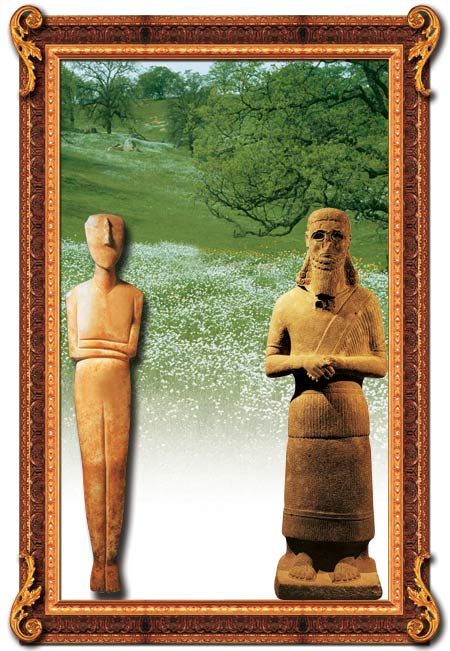 Could they not see that it did not reply to them and that it possessed no power to either harm or benetit them? (Surah Ta ha: 89) (Left) An idol from 2500-1100 BCE. (Right) The Assyrians believed that idols made of stone and wood could protect them from disasters. This idol, known as Hadad, was regarded as a protective idol by King Esarhaddon (seventh century BCE). |
These conversations Allah revealed in the Qur'an contain important wisdom. First and foremost, the Prophet Abraham's (pbuh) courageous and humble attitude is most striking. He carried out Allah's order, even at the risk of his own life, and invited his father to the true path. He risked losing his father's love, help, and goods; refused to be intimidated by his father's threats, and displayed the greatest humility and patience when told to leave.
Knowing that Allah would help him and show him the right path, he behaved according to the comfort and security that such knowledge imparted. The way that he immediately prayed to Allah after being unjustly forced to leave the house in which he lived, and his faith that his prayer would be heard demonstrate the exemplary modesty and purity required of a Muslim. Moreover, he displayed a most pleasing moral attitude toward his father, who was quite hostile. He maintained his moderate style and continued to call him my father. All Muslims should adopt this example of a very superior morality when calling people to the truth.
He approached his father with great affection and modesty, and humbly invited him to the true path. When his father persisted in his denial, the Prophet Abraham (pbuh) immediately sought refuge in Allah and removed himself. This attitude shows that Muslims are to work only for Allah's good pleasure, and to love what He loves and hate what He hates. Allah reveals this quality, which every Muslim should possess, thus:
It is not right for the Prophet and those who believe to ask forgiveness for the idolater—even if they are close relatives—after it has become clear to them that they are the Companions of the Blazing Fire. Abraham would not have asked forgiveness for his father but for a promise he made to him. And when it became clear to him [Abraham] that he [his father] was an enemy of Allah, he renounced him. Abraham was tender-hearted and forbearing. (Surat at-Tawba: 113-14)
Another noteworthy feature of this conversation between the Prophet Abraham (pbuh) and his father Allah revealed in the verses of the Qur'an, is the latter's devotion to paganism. So strong was his devotion that it led him to threaten his son with death by stoning, a son who was of his own blood, whom he had raised and kept by his side, and who treated his father so respectfully. The only reason for his father's wrath was that the Prophet Abraham (pbuh) worshipped only Allah and rejected his tribe's paganism. This is an example of the unbelievers' cruel, uncompromising, and oppressive natures.
Allah refers in the Qur'an to an unbelieving ruler whom the Prophet Abraham (pbuh) met when calling people to believe in Allah. Known as Nimrod in various historical sources, Allah reveals in the Qur'an that he and the Prophet Abraham (pbuh) engaged in an important conversation:
What about the one who argued with Abraham about his Lord, on the basis that Allah had given him sovereignty? Abraham said: "My Lord is He Who gives life and causes to die." He [Nimrod] said: "I too give life and cause to die..." (Surat al-Baqara: 258)
 ... Have done with the defilement of idols and have done with telling lies.Be people of pure natural belief in Allah not associating anything else with Him.As for anyone who associates... ...others with Allah,it is as though he had fallen from the sky and the birds and seized him and carried him away or the wind had dropped him in a distand place.(Surat al-Hajj: 30-31) |
As this verse makes clear, Nimrod had become very arrogant due to his goods, property, and rule. While talking with the Prophet Abraham (pbuh), he made the enormous and irrational claim that he also possessed the power of Creation. By proclaiming his own divinity in utter ignorance, as he was so proud of his wealth and chattel, he was, in fact, denying Allah. Because of his pride, he rejected to see Allah's might and power over the universe.
After informing Nimrod of Allah's existence and oneness, this unbeliever who grew arrogant against Allah, irrationally enters into debate with the Prophet Abraham (pbuh) and he makes a most wise and rational statement by the inspiration of Allah:
"Allah makes the Sun come from the East. Make it come from the West." And the disbeliever [Nimrod] was dumbfounded. Allah does not guide wrongdoing people. (Surat al-Baqara: 258)
 He has made night and day subserviend to you,and the Sun and Moon and stars,all subject to his command.There are certainly Signs that for people who use their intellect.(Surat an Nahl: 12) |
All prophets have always employed wise and rational arguments, such as the example given above. Allah has enabled those believers who spread His message to do so most effectively, thus refuting the unbelievers' mistaken worldview. Such arguments always leave unbelievers, who believe themselves to be on the right path and who trust in their wealth, power, and idols, unable to mount a serious defense of their belief systems. Therefore, they are always condemned to be defeated and at a loss for words.
Another important wisdom in the Prophet Abraham's (pbuh) response as seen in the verses is his honesty and naturalness. A sincere and honest explanation always influences peoples' hearts and consciences. Allah's existence is evident, and the believer's explanation of this manifest truth from the heart always touches other people. But even if they are so influenced, some unbelievers persist in their unbelief. Such people, who generally are far removed from religion, unwisely grow proud out of the belief that their wealth, attractiveness, or status are the results of their own efforts. They unjustly regard themselves as superior and forget about Allah. Satan encourages their pride and uses the power and position that they mistakenly consider their own, to prevent them from serving Allah.
Believers encounter many people as they spread Allah's message. Many people, due to their pride, cannot see Allah's might and power. In such situations, believers must give examples that show people just how helpless they really are in order to eliminate their pride. As a result, unbelievers will realize that their arrogance and pride in their possessions are of no significance. Gradually, they will realize that their strength and power are limited, that everything will end with death, and that Allah is the only absolute being.
The mode of explication used by the Prophet Abraham (pbuh) to relay the truth to Nimrod shows just how important the use of rational, wise, and target-oriented speech is in spreading His message. Believers must never engage in pointless arguments; rather, they must always use effective and rational explanations to defeat the audience's superstitious beliefs and demonstrate Allah's existence by analyzing the audience members' psychological states and logical frameworks. Clearly, only people with deep faith, who scrupulously adhere to Allah's commands and who hold Him in awe, will be able to devise such an effective and wise mode of explication. This is true, because wisdom is a divine blessing that must be sought from Allah. Allah imparts this secret to us, as follows:
He gives wisdom to whoever He wills, and he who has been given wisdom has been given great good... (Surat al-Baqara: 269)
 Evry self will taste death.You will be paid your wages in full on the Day of Resurrection.Anyone who is distancec from the Fire and admitted to the Garden has triumphed.The life of this world is just the enjoymend of delusion. (Surah Al'İmran: 185) |

How should believers behave with those who deny or reject the truth? Allah tells believers to spread His message in a well-considered style and method. There is more than one way of calling people to the truth. Naturally, the method changes according to the audience members' positions, conditions, ideas, and beliefs. For example, Allah refers to the Prophet Noah (pbuh), who explained His existence both publicly and privately by using indirect methods to turn them toward His religion. (Surah Nuh: 9)
Another one of the Prophet Abraham's (pbuh) most noteworthy methods was to incite his tribe's consciences and to employ methods that would encourage them to think. He asked them questions, thereby exposing the irrational and confused nature of their beliefs. He showed them that their idols were nothing more than unconscious pieces of wood and stone, and used a clever plan to convince their hearts and minds of this. As he caused his tribe's traditional pagan worldview to collapse by spreading Allah's truth, he also explained Allah's existence and oneness. In the Qur'an Allah describes the Prophet Abraham's (pbuh) method in the following words:
When night covered him [Abraham], he saw a star and said: "This is my Lord!" Then when it set, he said: "I do not love that which sets." Then when he saw the Moon come up, he said: "This is my Lord!" Then when it set, he said: "If my Lord does not guide me, I will be one of the misguided people." Then when he saw the Sun come up, he said: "This is my Lord! This is greater!" Then when it set, he said: "My tribe, I am free of what you associate with Allah! I have turned my face to Him Who brought the heavens and Earth into being, a pure natural believer. I am not one of the idolaters." (Surat al-An'am: 76-79)
 Obey Allah and obey the Messenger and beware!If you turn your backs,know that Our Messenger is only responsible for clear transmission. (Surat al-Ma'ida: 92) |
The Prophet Abraham's (pbuh) comments regarding the Moon, the Sun, and stars in these verses above are probably not his own thoughts, but rather a means of communicating Allah's message to his tribe. (Allah knows the truth.) The Prophet Abraham (pbuh) knew that the Moon and stars would disappear when the Sun rose, and that the Sun would sink again after it had risen. Since his pagan tribe were not reasoning and judging in the light of true faith, however, he may have chosen to employ the gradual explanation outlined above.
As we mentioned earlier, in a grave irrationality the pagan societies in the Middle East at that time worshipped celestial bodies, such as the Sun and the Moon, in addition to idols made by themselves and their ancestors. Therefore, the Prophet Abraham (pbuh) may have wished to use the question-and-answer method to explain why these supposedly divine objects were not actually divine. And so he first portrayed the stars as divine in order to draw his tribe's attention to them, and then proved, as Allah inspired him, why these could not actually be deities. Allah reveals the Prophet Abraham's (pbuh) expression in a verse, "I do not love what sets" (Surat al-An'am: 76) is also an important message aimed at his tribe, for he indirectly explained that a divine entity was immortal and indestructible. (Allah knows the truth.) In fact, these are some of our Lord's names: al-Baqi (He Who continues, the immortal one) and al-Qa'im (He Who persists).
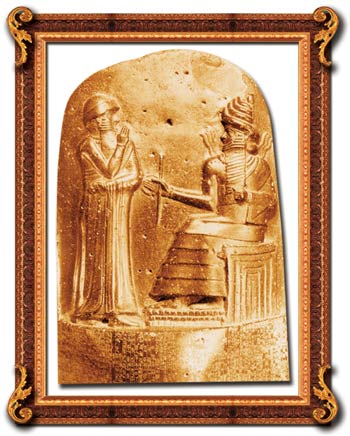
This statue depicts Hammurabi (app. 1955- 13 BCE) paying respect to Shamash, the Sumerian sun god.
After this, the Prophet Abraham (pbuh) may have employed the same method with regard to the Moon, another so-called deity, to show his tribe that it was not divine. He may have used the same logic for the Sun, particularly by emphasizing that it was the greatest. His explanation that it was not divine dealt a major blow to their pagan worldview, because beyond the Sun there was no greater physical being visible to the tribe.
With the words Allah reveals in the Qur'an as "I am not one of the idolaters" (Surat al-An'am: 79), the Prophet Abraham (pbuh) explained that Allah created all of these things, that He was the true Allah, and that he ascribed no partners to Him. Given the above, we can see that the Prophet Abraham (pbuh) knew a great deal about his tribe's pagan belief system. He put forward all of these examples to spread Allah's message and to expose their defective logic and misguided beliefs. In fact, it seems that his tribe sought to debate with him:
His tribe argued with him. He said: "Are you arguing with me about Allah, when He has guided me? I have no fear of any partner you ascribe to Him, unless my Lord should will such a thing to happen. My Lord encompasses all things in His knowledge, so will you not pay heed?" (Surat al-An'am: 80)
In calling his tribe to the truth, the Prophet Abraham (pbuh) acted upon what He inspired in him. This is clearly evident from the methods he employed and the examples he gave. In the verse "This is the argument We gave to Abraham against his tribe. We raise in rank anyone We will. Your Lord is All-Wise, All-Knowing" (Surat al-An'am: 83), Allah reveals that He gave the Prophet Abraham (pbuh) various proofs to use against his tribe.
This manner of communication sets an example for all Muslims. In other words, believers must demolish the other side's false and groundless beliefs and then present indisputable proof of Allah's existence and oneness. Following this, they must call on the other side to believe in Allah and serve only Him. If the other side cannot abandon its misguided belief system and distorted logic, it will be difficult for them to believe in Allah and become true Muslims. True faith can come about only when people abandon all of their idols and superstitious ideologies and philosophies.
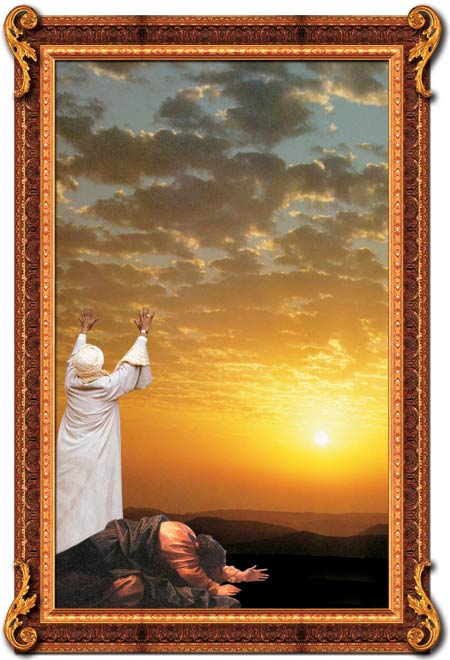 "I found both her[Queen of saba]and her people proostrating to the Sun instead of Allah.Satan has mede their actions seem good to them and debarred them..." (Surat an-Naml: 24) |
The Prophet Abraham's (pbuh) love of Allah, joyous faith, and scrupulous adherence to His commands can be clearly seen in how he conducted himself with others. The way in which he communicated with his father and tribe shows in the finest possible way that he was chosen by Allah, Who made him superior to all others. In the Qur'an Allah reveals:
Recite to them the story of Abraham, when he asked his father and his tribe: "What do you worship?" They said: "We worship idols and will continue to cling to them." He asked: "Do they hear you when you call? Do they help you or harm you?" They said: "No, but this is what we found our fathers doing." He asked: "Have you really thought about what you worship, you and your fathers who came before?" (Surat ash-Shu'ara: 69-76)
As can be seen in the above verses, the Prophet Abraham (pbuh) used various methods and analogies to explain to his tribe how futile and irrational it was to worship idols. Their only response was that they would continue to follow their ancestors' path as Allah states in the verses. This vastly unwise response is frequently encountered in societies that are far from religion and is often used to justify superstition, although it has no foundation in the face of divine religion. In the continuation of these verses, the Prophet Abraham (pbuh) calls his tribe to faith and introduces them to our Lord:
"They are all my enemies—except for the Lord of all the worlds: He Who created me and guides me; He Who gives me food and drink; and when I am ill, He heals me; He Who will cause my death and then give me life; He Who I sincerely hope will forgive my mistakes on the Day of Reckoning." (Surat ash-Shu'ara: 77-82)
As Allah states in the Qur'an, the Prophet Abraham's (pbuh) tribe frequently stated their determination to persist in their paganism. He responded by praising our Lord with His finest names. Only Allah creates or destroys everything in the universe, animate or inanimate. Only He gives all blessings on Earth for the service of humanity and provides an infinite number of beauties. The way a human being is born, grows, eats, drinks, walks, moves, speaks, and laughs—in short, everything in life—happens by Allah's will. As the Prophet Abraham (pbuh) reveals, our Lord Allah heals sick people, by restoring them to health. Unless Allah wills, no medicine or doctor can restore anyone to health.
Allah creates humanity and, in the same way, will take each person's soul at the moment of his or her death. Even before a person is born, Allah has already established the length of his or her life, what will happen to them, and all that they will say and do. In other words, people do not control their destiny, for Allah has written it even before the person is born.
 The unseen of the heavens and the Earth belogs to Allah and the whole affair will be returned to Him.So worship Him and put your trust in Him... (Surah Hud: 123) |
Allah created this world as a testing arena and then sent messengers to lead others to the true path by means of revelation. On the Day of Judgment, every human being will have to account for what he or she did while in this world. Believers who spend their lives doing good in the hope of earning His good pleasure and mercy will meet with countless blessings. Allah, Who is most merciful, forgiving, and loving toward His servants, has promised to cover the evil deeds of His servants on the Day of Judgment, to forgive their mistakes, and to reward them with the countless blessings of Paradise.
Remember that human beings have no power to bring others to the true path, for their only responsibility is to relay His message. In fact, this is a religious obligation for all believers. Whether or not an unbeliever turns to faith depends totally on Allah's guidance, for no one can believe unless Allah so wills. Indeed, despite the strength that the Prophet Abraham (pbuh) acquired from his faith in Allah, his pagan tribe, who had no fear of Allah and ignored their consciences, persisted in their denial. In fact, they went so far as to threaten the Prophet Abraham (pbuh) with death by fire. Thus, all believers must devoutly and determinedly call those around them to the true path and not despair if they are ignored and persecuted.
In one verse, our Lord states that "... It is the truth from your Lord; so let whoever wishes believe and whoever wishes disbelieve" (Surat al-Kahf: 29). In another verse Allah reveals to our Prophet (may Allah bless him and grant him peace) that "Perhaps you will destroy yourself with grief because they will not become believers" (Surat ash-Shu'ara: 3). In Surah Yusuf, Allah reveals that "But most people, for all your eagerness, are not believers. You do not ask them for any wage for it. It is only a reminder to all beings" (Surah Yusuf: 103-104).
One reason why the Prophet Abraham's (pbuh) tribe persisted in their denial was their concern for their own interests. Their pagan belief system provided them with various worldly advantages, and any change to the established order would conflict with those interests, just as our Prophet's mission (may Allah bless him and grant him peace) upset the Meccan leaders, who enjoyed enormous commercial profits due to Arabia's paganism. This is actually a law that Allah has decreed for His prophets. As Allah states in the Qur'an, the prophets have always been opposed by their tribe. They have been threatened with death and subjected to slander, and sometimes have even been accused of sorcery, madness, and ascribing their own words to Allah. In sum, those who accused the prophets had no hesitation about resorting to such falsehoods as asserting that the prophets were on the wrong path while they were on the right path.
However, these people are laboring under a cloud of irrationality, for while mistakenly trying to protect their own interests, they are actually condemning themselves to eternal suffering. Allah has revealed the fate of those who rebel against His prophets, those role models of pleasing moral values, godliness, and deep faith:
... They have brought down anger from Allah upon themselves, and they have been plunged into destitution. That was because they rejected Allah's signs and killed the prophets without any right to do so. That was because they disobeyed and went beyond the limits [that Allah has established for humanity]. (Surah Al 'Imran: 112)